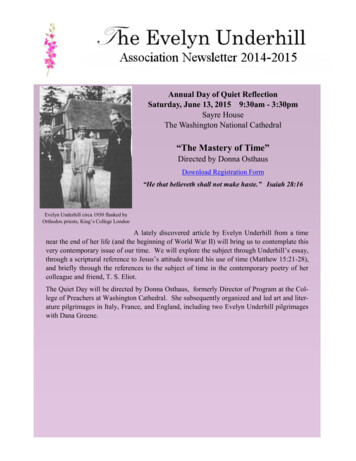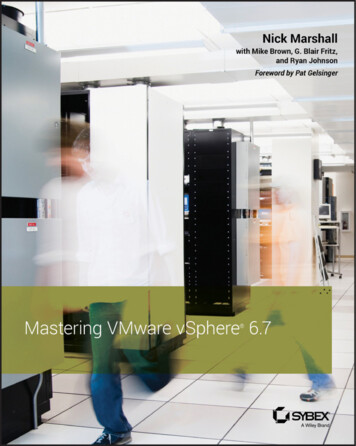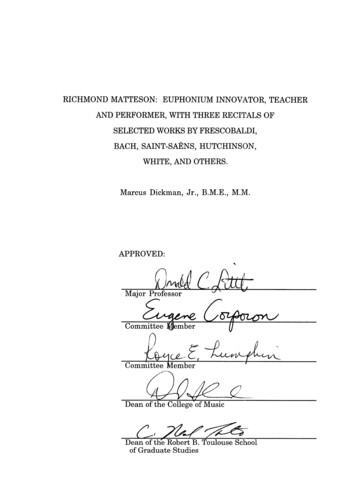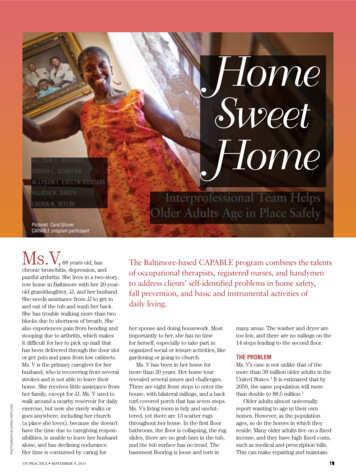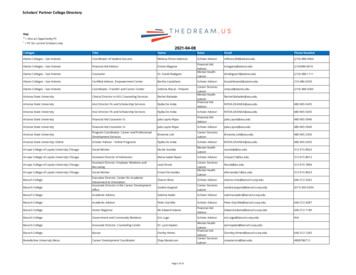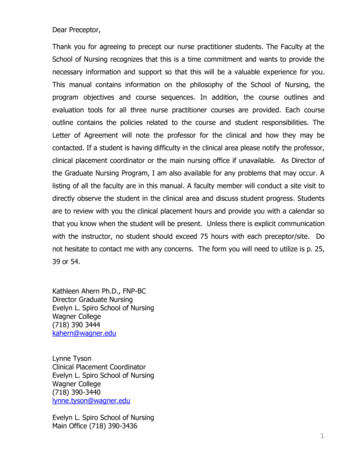
Transcription
Dear Preceptor,Thank you for agreeing to precept our nurse practitioner students. The Faculty at theSchool of Nursing recognizes that this is a time commitment and wants to provide thenecessary information and support so that this will be a valuable experience for you.This manual contains information on the philosophy of the School of Nursing, theprogram objectives and course sequences. In addition, the course outlines andevaluation tools for all three nurse practitioner courses are provided. Each courseoutline contains the policies related to the course and student responsibilities. TheLetter of Agreement will note the professor for the clinical and how they may becontacted. If a student is having difficulty in the clinical area please notify the professor,clinical placement coordinator or the main nursing office if unavailable. As Director ofthe Graduate Nursing Program, I am also available for any problems that may occur. Alisting of all the faculty are in this manual. A faculty member will conduct a site visit todirectly observe the student in the clinical area and discuss student progress. Studentsare to review with you the clinical placement hours and provide you with a calendar sothat you know when the student will be present. Unless there is explicit communicationwith the instructor, no student should exceed 75 hours with each preceptor/site. Donot hesitate to contact me with any concerns. The form you will need to utilize is p. 25,39 or 54.Kathleen Ahern Ph.D., FNP-BCDirector Graduate NursingEvelyn L. Spiro School of NursingWagner College(718) 390 3444kahern@wagner.eduLynne TysonClinical Placement CoordinatorEvelyn L. Spiro School of NursingWagner College(718) 390-3440lynne.tyson@wagner.eduEvelyn L. Spiro School of NursingMain Office (718) 390-34361
Table of ContentsPAGEPhilosophy of the School of Nursing3Program Objectives4Program of Study6Course Descriptions7Schemas for Family Nurse Practitioner13Course Outline / NR 64118Practicum Evaluation Tool / NR 64125Course Outline / NR 64332Practicum Evaluation Tool / NR 64339Course Outline / NR 64547Practicum Evaluation Tool / NR 64554Clinical Site Visit Evaluation Tool61Preceptor Information & Site Request64Family Nurse Preceptor Evaluation67Patient Tracking Form68Clinical Hours Preceptor Record69NONPF Preceptor FAQ’s702
Philosophy of the School of NursingThe philosophy of the School of Nursing is to provide an educational program ofstudy for professional nursing and for professional nurses. The academic program forundergraduates and graduates complements and is consistent with the mission ofWagner College.kWithin the philosophy there are beliefs and practices which define the means toachieve the objectives and are expressed in the “community-based” approach tonursing education and practice.NursingNursing is an art and a science, which provides an essential service to society byassisting and empowering individuals to achieve optimal health. As a caring profession,nursing promotes the health and well-being of society through the leadership of itsindividual members and its professional organizations. Professional nursing educationprovides critical thinking skills to assist professional nurses to become independent andcollaborative practitioners who make clinical judgments and act with responsibility. Theunique function of the professional nurse is to assist individuals and groups to fosterhealth and health seeking behaviors.Advanced practice registered nurses have acquired the knowledge base andpractice experiences to prepare them for specialization, expansion and advancement inpractice, (from ANP policy statement).HealthHealth is a dynamic state of being which is formed by the individual’s holisticresponses to their environment.The optimum state of health is unique for eachindividual throughout the lifespan and is affected by the bio-psychological, spiritual, andsocio-cultural influences on both one’s internal and external environment.IndividualHuman life has inherent value and dignity. Each individual is a unique, holisticbeing and an integral part of a family, the community, and socio-cultural systems.Human beings are in continual interaction with the environment across thelifespan. Society is a cooperating group of individuals partnered with the community,whose individuality influences the development of organized patterns of relationships,3
interactions and rules which are responsible for the prevailing social order.EnvironmentCultural values, beliefs, morals and experiences affect human beings adaptationto the environment.Individuals are in continual interaction with the environmentacross their lifespan.Each individual has an internal environment consisting of allprocesses inherent to self. This internal environment is in a constant state of flux withthe external environment, which encompasses interactions with people, places, objectsand processes.Mission of the Nursing Program at the Masters LevelThe mission of the graduate nursing program is designed for professional nursesto prepare them to advance nursing knowledge and abilities generally and in a specificfunctional area. The master’s curriculum is based on the philosophy of the School ofNursing and Wagner College. It is organized around key concepts of nursing, health,individual, and environment. Students in the program have the opportunity to expandtheir knowledge base, synthesize knowledge into new concepts and theories, testtheories, create new ideas and processes, and apply them in nursing practice. Studentsare given the opportunity to learn strategies of leadership and change in order toimprove nursing practice and the health status in a diverse society.The graduatestudent is prepared in the role areas of nurse educator or family nurse practitioner.The program prepares its graduates to actively participate in improving the delivery ofsafe, patient centered health care across the life span, conducting research for evidencebased practice, and acquiring a foundation for doctoral study.Program ObjectivesIn order to fulfill the purposes of the Wagner College graduate nursing program,the student must meet the following program objectives.Upon completion of the program students will be able to:1. Evaluate nursing practice as it influences the quality of services provided withinthe health care system.4
2. Analyze nursing theories and strategies in practice to promote, restore, andmaintain the optimum level of health of populations across the life span.3. Use research to improve nursing practice.4. Function as catalysts for change in collegial roles with other health professionalsto improve the health care delivery system.5. Demonstrate leadership roles by functioning as: a.) nurse educators in collegiatenursing programs or staff development programs; or b.)family nursepractitioners.6. Promote responsibility and accountability in themselves and others in their rolesas educators and practitioners.Additional Admission RequirementsThe following requirements for the Master of Science in nursing are in addition tothose for all master’s degrees.1. Completion of an accredited baccalaureate program with a major in nursingincluding a course in nursing research. Other baccalaureate programs will beindividually reviewed2. A minimum overall undergraduate G.P.A. of 3.03. Current Registered Nurse License.4. Demonstration, prior to the registration for clinical courses, of:a.) annualphysical examination with current immunizations; b.) current malpracticeinsurance coverage.5. For the Family Nurse Practitioner track, the applicant must submit documentationdemonstrating current clinical practice.6. Applicants who do not meet admission requirements have the opportunity to beindividually evaluated.Degree Requirements: Successful completion of 44/45 credits.5
Program of StudyRequired Courses for All StudentsNR 611 Theoretical Components of Nursing3 creditsNR 615 Advanced Pathophysiology3 creditsNR 616 Advanced Health Assessment4 creditsNR 621 Dynamics of Family Health Nursing3 creditsNR 622 Health Care Policy Organization and Finance3 creditsNR 623 Advanced Pharmacodynamics for Primary Care3 creditsNR 624 Advanced Research3 creditsNR 631 Evaluation and Instrumentation in Nursing3 creditsNR 793 Civic Corporate Engagement Project DevelopmentSeminar3 creditsElective3 creditsTotal31 creditsRequired Courses for the Family Nurse Practitioner RoleNR 609 Management of Common Conditions3 creditsNR 617 The Advanced Practice Nurse3 creditsNR 641 Family Health Nursing I2 creditsNR 643 Family Health Nursing II3 creditsNR 645 Family Health Nursing III3 creditsTotal14 credits6
Course Descriptions:NR609 Management of Common Conditions. Three credits. This course focuses onthe management of common conditions encountered by the advanced practice nurse inprimary care. Emphasis will be placed on developing diagnostic reasoning skills andutilizing a holistic evidenced approach to clinical care. Prerequisite: NR 615. Offeredspring semester.NR611 Theoretical Components of Nursing. Three credits. The purpose of thiscourse is to explore, discuss, and formulate concepts of individuals, environment,health, and nursing as they relate to nursing theories. Philosophical inquiry andhistorical trends, as a basis for theory development, are examined. Students examineknowledge from the sciences, humanities, and nursing and how it can be applied tonursing in education, administration, and advanced practice. Offered fall semester.NR615 Advanced Pathophysiology. Three credits.This course focuses on thepathogenesis of common conditions affecting individuals and families as a basis fornursing primary care management. Offered fall semester.NR616 Advanced Health Assessment. Four credits. Students develop sophisticationin the ability to assess and evaluate subtle diagnostic cues in client populations acrossthe life span. Emphasis is placed on enhancing students’ clinical judgment. Offeredspring semester. Required lab experience. Offered spring semester.NR617 The Advanced Practice Nurse. Three credits. This course focuses onexploring issues relating to graduate nursing education and the advanced practice role.Contemporary concerns such as the politics of health care reform, the advancedpractice nurse’s usefulness and marketability, and the legal responsibility andaccountability of the professional nurse in advanced practice are analyzed. Offeredspring semester.NR621 Dynamics of Family Health Nursing. Three credits. This course focuses onthe primary care dynamics and needs of families. Psycho-socio-cultural, economic,7
spiritual, community, and educational paradigms are explored. Risk assessment andinterventions are investigated and analyzed to promote the stability of a family’s healthstatus. Offered fall semester.NR622 Health Care Policy, Organization, and Finance. Three credits. This coursepresents an overview of health care policy formulation, health care organization andfinancing. Nurses as health care providers, coordinators, and advocates will study thetheories and competencies needed to function in a new and complex health careenvironment. Offered spring semester.NR623 Advanced Pharmacodynamics for Primary Care. Three credits. Coursecontent will focus on the pharmacological management of self-limiting episodiccomplaints and stable chronic disease states commonly managed by advanced practicenurses. Offered fall semester.NR624 Advanced Research. Three credits. The components of research design,methodology, and statistical analysis are presented. The students develop the neededknowledge base to prepare them to conduct research studies. Prerequisite: NR 611.Offered spring semester.NR631 Evaluation and Instrumentation in Nursing. Three credits. This courseoffers students the knowledge and skills needed to collect, critically appraise, integrate,generate, and evaluate evidence for nursing practice. Prerequisite: NR 624. Offered fallsemester.NR641 Family Health Nursing I. Two credits. This course is the first course in thesupervised clinical experience for the family nurse practitioner role. The emphasis is ondeveloping clinical judgment in the primary care setting through critical analysis ofsubjective and objective client data. The clinical experience consists of 200 hours plus aweekly seminar. Prerequisites: NR611, 615, 616, 617, 623, Prerequisite or CorequisiteNR609 and NR621. In addition all students are required to show evidence of a currentRN license, malpractice insurance, recent physical examination with titers, and proof of8
current health insurance. Students must see the professor prior to registration toarrange clinical experiences. Offered fall and spring semesters.NR643 Family Health Nursing II. Three credits. This clinical course is a continuationof Family Health Nursing I. Students is afforded the opportunity to enhance clinical skillsand judgments developed in the previous course. Supervised clinical practices inprimary care settings with preceptors are maintained. The clinical experience consists of200 hours plus a weekly seminar. Prerequisite NR 641. In addition all students arerequired to show evidence of a current RN license, malpractice insurance, recentphysical examination with titers, and proof of current health insurance. Students mustsee the professor prior to registration to arrange clinical experiences. Offered fall andspring semesters.NR645 Family Health Nursing III. Three credits. This clinical course is acontinuation of Family Health Nursing II. Students are afforded the opportunity tocontinue to enhance clinical skills and judgments developed in the previous courses.This is the last clinical course for the family nurse practitioner. At the end of this coursestudents are expected to demonstrate competency in this role. Supervised clinicalpractice takes place in a variety of primary care settings with preceptors. The clinicalexperience consists of 200 hours plus a weekly seminar. Prerequisite: NR643. Inaddition all students are required to show evidence of a current RN license, malpracticeinsurance, recent physical examination with titers, and proof of current healthinsurance. Students must see the professor prior to registration to arrange clinicalexperiences Offered fall and spring semesters.NR691 Special Topics in Nursing. Three credits. Content varies to meet the specialinterests of graduate students and faculty. Offered periodically.NR693 Independent Study. One to four credits. Course designed for independentadvanced level study on a topic of the student’s own choosing after advisement bysponsoring departmental faculty. Students may use this course to engage in9
collaborative research with faculty. Prerequisite: permission of advisor and of director ofgraduate nursing. Offered fall and spring semesters.NR793 Civic Corporate Engagement Project Development Seminar. Threecredits. This course uses the parameters of the scientific process to investigate aspecial, health-related problem as currently seen in society. Students are expected todesign and implement a health related project. This course is taken in the last academicyear before graduation. NR631 Prerequisite or Co-requisite. Offered fall and springsemesters.NR699 Summer Practicum Supervision, 0 credits. This practicum affords the nursepractitioner student an opportunity to complete up to 75 hours of clinical preceptedpractice under the guidance of faculty. The hours may be applied towards the requiredclinical hours for NR643 or NR645. Students must have completed NR641 in order toparticipate in this practicum. (Fee applies)10
Post Master’s Advanced Certificate Program for Family Nurse PractitionerProgram of StudyThe Post Master’s Certificate Program for Family Nurse Practitioner builds on anearned master’s degree in nursing. The student completes 27 credits, inclusive ofprecepted clinical practice. Graduates completing this program will be certified by theNew York State Education Department as Family Nurse Practitioners.Admission Requirements1. Master’s degree in nursing from an accredited program with a minimum G.P.A. of3.0.2. Current New York State licensure as a Professional Registered Nurse.3. Malpractice insurance coverage.4. Current immunization and physical examination.5. Two (2) letters of reference attesting to applicant’s current knowledge base, clinicalcompetency and experiences, professional capabilities, and potential for successfullyassuming an advanced practice role.6. Current Curriculum Vitae/Resume.An application can be obtained from the Graduate Admissions Office, Campus Hall.Curriculum Schema of CoursesNR609 Management of Common Conditions3 creditsNR615 Advanced Pathophysiology3 creditsNR616 Advanced Health Assessment4 creditsNR617 The Advanced Practice Nurse3 creditsNR621 Dynamics of Family Health Nursing3 creditsNR623 Advanced Pharmacodynamics for Primary Care3 creditsNR641 Family Health Nursing I2 creditsNR643 Family Health Nursing II3 creditsNR645 Family Health Nursing III3 creditsTotal 27 credits11
GRADUATE PROGRAM OF STUDYCore Courses for All 793ElectiveCourseCreditsTheoretical Components of NursingDynamics of Family Health NursingAdvanced Patho-PhysiologyAdvanced Health AssessmentHealth Care Policy Organization and FinanceAdvanced Pharmacodynamics for Primary CareAdvanced ResearchEvaluation and Instrumentation in NursingCivic Corporate Engagement Project Development333433333331Total CreditsRequired Courses for the Family Nurse Practitioner RoleNR609NR617NR641NR643NR645CourseManagement of Common ConditionsThe Advanced Practice NurseFamily Health Nursing IFamily Health Nursing IIFamily Health Nursing IIITotal CreditsCredits332331412
Masters in NursingCurriculum Schema for Family Nurse PractitionerFull-Time Study, 5 Semesters**Fall Entry**Fall SemesterCreditsNR611Theo Components of NursingCreditsSpring Semester3NR617 Advanced Practice Nurse3NR615 Advanced Pathophysiology3NR616 Advanced Health Assessment**4NR623 Advanced Pharmacology3NR609 Management of Common Conditions3Total9TotalFall SemesterCreditsCredits10Spring SemesterNR621 Family Dynamics3NR624 Advanced Research3Elective3NR643* Family Health Nursing II3NR641* Family Health Nursing I2NR622 Nursing Health Care Policy,Organization & Finance3Total8Total9Fall SemesterNR645* Family Health Nursing IIICredits3NR793* Civic Corporate EngagementProject Development Seminar3NR631 Evaluation and Instrumentationin Nursing3Total9Total Credits 45*Offered Both Semesters** Includes Lab Component13
Masters in NursingCurriculum Schema for Family Nurse PractitionerFull-Time Study, 5 Semesters**Spring Entry**Spring SemesterNR617 Advanced Practice NurseCredits3NR616 Advanced Health Assessment**4NR622 Nursing Health Care Policy,Organization & Finance3Fall SemesterNR611 Theo Components of NursingCredits3NR615 Advanced Pathophysiology3NR6213Family DynamicsNR 623 Advanced Pharmacology3Total10Total12Spring SemesterCreditsFall SemesterCreditsNR624 Advanced Research3NR631Evaluation and Instrumentationin Nursing3NR641* Family Health Nursing I2Elective3NR609 Management of Common Conditions3NR643 Family Health Nursing II3Total8Total9Spring SemesterCreditsNR645* Family Health Nursing III3NR793* Civic Corporate EngagementProject Development Seminar3Total6Total Credits 45*Offered Both Semesters** Includes Lab Component14
Masters in NursingCurriculum Schema for Family Nurse PractitionerPart-Time Study, 7 Semesters** Spring Entry**Spring SemesterCreditsFall SemesterCreditsNR622 Nursing Health Care Policy,Organization & Finance3NR611 Theo Components of Nursing3NR616 Advanced Health Assessment**4NR615 Advanced Pathophysiology3Total7Total6Spring SemesterCreditsNR624 Advanced ResearchCreditsFall Semester3NR621 Dynamics of Family Health3NR617 The Advance Practice Nurse3NR623 Advanced PharmacodynamicsPrimary Care3Total6Total6Spring SemesterCreditsFall SemesterCreditsNR641* Family Health Nursing I2NR631 Evaluation & Instrumentation3NR609 Management of CommonConditions3NR643* Family Health Nursing II3Elective3Total5Total9Spring SemesterCreditsNR645* Family Health Nursing III3NR793* Civic Corporate EngagementProject Development Seminar3Total6Total Credits 45*Offered Both Semesters** Includes Lab Component15
Masters in NursingCurriculum Schema for Family Nurse PractitionerPart-Time Study, 7 Semesters**Fall Entry**Fall SemesterCreditsSpring SemesterCreditsNR611 Theo Components of NursingConditions3NR609 Management of Common3NR615 Advanced Pathophysiology3NR616 Advanced Health Assessment**4Total6Total7Fall SemesterCreditsSpring SemesterCreditsNR621 Dynamics of Family HealthNursing3NR624 Advanced Research3NR623 Advanced PharmacodynamicsPrimary Care3NR617 The Advance Practice Nurse3Total6Total6Fall SemesterCreditsSpring SemesterCreditsNR631 Evaluation & Instrumentationin Nursing3NR643* Family Health Nursing II3NR641* Family Health Nursing I2NR622 Nursing Health Care Policy,3Organization & Finance3Total8Total6Fall SemesterCreditsNR645* Family Health Nursing III3NR793* Civic Corporate EngagementProject Development Seminar3Total6Total Credits 45*Offered Both Semesters**Includes Lab Component16
Post Master’s Advanced Certificate ProgramFor Family Nurse PractitionerCurriculum Schema of CoursesFall SemesterCreditsCreditsSpring SemesterNR615 Advanced Pathophysiology3NR609 Nursing Management ofCommon Conditions3NR621 Dynamics of Family Health3NR616 Advanced Health AssessmentNursing**4NR623 Advanced Pharmacodynamics forPrimary Care3NR617 The Advanced Practice Nurse3Total9TotalFall SemesterNR641* Family Health Nursing ICredits2Spring SemesterNR643* Family Health Nursing II10Credits3Fall SemesterNR645* Family Health Nursing III3TOTAL CREDITS 27**Includes Lab Component17
The Evelyn L. Spiro School of Nursingat Wagner CollegeNR 641:Family Health Nursing IFaculty:Edna Aurelus, DNP, FNP-BC, RN-BCPlacement in Curriculum:Offered each semesterPrerequisites:NR 611, 615, 616, 617, 623NR 609, 621 Prerequisite or Co requisiteCredits:2Contact Hours:215COURSE OVERVIEW:This is the first of three seminar/practicum courses that prepares students to functionas in the advanced practice role of family nurse practitioner. The active learningexperience is that of providing care to families across the life span in the community.The care provided addresses the needs of those experiencing self limited episodiccomplaints or those with stable chronic disease states. The student uses concepts ofhealth promotion, applies information on diet and exercise, carries out proceduralprotocols, and selects guidelines of care to administer nursing treatment to individualsin various stages of wellness. Focusing on the goals of health promotion and diseaseprevention, students become apprised of and use information from national resourcesfor patient/family health education.One aspect of the course is the seminar which meets for 15 clock hours throughout thesemester. Seminars provide students the opportunity to offer case presentations thatcover a client's presenting problem, physical findings, history, and diagnosis withdifferential, tests ordered, procedures, treatment plan, pharmacology, health teachingand disposition. Growth and development, epidemiology, cultural, and psychosocialissues are integrated throughout the presentation. The focus in this course is doingphysical examinations, beginning focused visits in office and community, populationhealth and adult care with some pediatrics/family health.The additional learning aspect is the clinical practicum where the student completes 200hours in various primary care settings. The supervised clinical practicum provides thestudent with opportunities to design, implement, and evaluate comprehensive careprovided to clients/families. Preceptor supervision is provided by practicing nursepractitioners and physicians in the community.18
Student Learning Outcomes:Upon completion of this course, the student will be able to:1. Demonstrate beginning competency in the management of health/illness,identifying client specific health promotion needs using the principles of life spandevelopment and Evidenced Based Practice2. Develop effective interpersonal transactions as they relate to therapeuticoutcomes3. Use effective teaching skills to impart knowledge to patients and families inprimary care4. Improve health care outcomes by interacting within health care systems toensure quality outcomes and culturally sensitive care5. Cultivate the role of the advanced practice nurse by demonstrating acommitment to the implementation, preservation and evaluation of the familynurse practitioner roleTEACHING STRATEGIES:1.Seminar and discussion2.Clinical testing & classroom testing3.Presentations by faculty4.Student Presented Case Studies and assigned topics5.Video & Computer Assisted learning (EKG, Disability CD & Universal Precaution DVD)6.PDA use7.Interactive web based Health Assessment with Shadow Health8.Simulation scenarios as available (Adult and M/CH)9.Meetings or conferences as assigned10. Students current knowledge and sharing of health issues.GRADE:20%20%20%20%20%SOAPs and casesForms, paperwork, attendance & participationPortfolioPresentationQuizzes and tests19
EVALUATION METHODS:1. Preceptor Evaluations2. Student's Practicum Logs and Portfolios3. Case Assignment Presentations4. Pre – Clinical Practical Testing in LAB5. Health Fairs and community assignments6. Shadow Health Assignments (HA & HX)7. Quizzes8. Attendance and participation9. Adherence to paperwork requirement such as monthly practice calendars.10.SOAP assignments (2)The course will be passed by students who, in the judgment of the faculty andpreceptor(s), are clinically competent and who have completed all course requirementsincluding community assignments. Students may be asked to spend additional hours inthe clinical agency until competence is demonstrated. These decisions are at thediscretion of the faculty and preceptor. Students carrying an incomplete in this courseare required to attend seminars until the incomplete is removed. The clinical portion ofthe course is P/F and, if F, this includes theory. A failure of the theory or clinicalportion entails repeating the entire course. For 2 or more absences, one letter gradeless. All clinical evaluation forms are available in the preceptor manual.REQUIRED TEXTS:1.Cash, Jill C., Glass, Cheryl A., Family Practice Guidelines, 3rd Ed. Springer Pub.2.Domino, Frank J., Baldor, Robert A., Grimes, Jill A., Golding, Jeremy, The FiveMinute Clinical Consult 2016, 24th edition. Lippincott, Williams & Wilkins3.Prabhu, F., Bickle,L., Case Studies to Accompany Bates Guide to PhysicalExamination and History Taking 9th edition. Lippincott Williams & WilkinsRECOMMENDED tonthManual: Manual of medical therapeutics. (34 edition). Little Brown & Co.2.Chen, Michael, Pope, Thomas, Ott, David.McGraw-Hill Professional PublishingBasic Radiology (2nd Edition).3. Thaler, Malcom S. The only ECK book you’ll ever need (8th edition) Philadelphia:Lippincott, Williams & Wilkins4.Download monthly Prescriber Index and Epocrates5.*All previous Core NP texts20
COURSE REQUIREMENTS:IPrior to beginning any clinical hours all students:1. Must pass a competency based clinical examination in advanced healthassessment skills (administered in the NRC by clinical professor who also willfollow you at the site) Note that students now have access to a web basedHealth Assessment Program from their home computer. Please see the Directorof the Nursing Resource Center for a pass word to use this program2. copies of the following must be submitted to faculty prior to doing clinical hoursand kept on file and be current:a. Current RN Licenseb. BLS Certificationc. Malpractice Insurance with “student FNP” claused. Personal Health Insurance Policy (copy) up to datee. Yearly Physical and HIPPA signature on Wagnerf. College form original, with all required labsg. Any additional requirements as dictated by the clinical agencyPlease keep copies of the above documentation at all time, the office is notresponsible to provide copies.Students are responsible for maintaining CURRENT documentation. Forms shouldbe sent to agencies as required. Students will not be permitted to continue in fieldwork if documents expire. Students in breach of this requirement will put their PASSstatus in jeopardy. All documents must be in student’s file as well. Students areresponsible for interacting with office staff to verify contracts and forms, as well asupdated calendars on file.II IT IS THE STUDENT'S RESPONSIBILITY TO MEET THE CLINICAL TIMEREQURIEMENTS AND TO SCHEDULE THEIR CLINICAL PRACITICUM AS WELL AS TONOTIFY THE OFFICE AND FACULTY OF THEIR PRACTICUM SCHEDULE VIAMONTHLY CURRENT PRINTED CALENDARS. FACULTY WILL CONDUCT REGULARSUPERVISION AND SITE VISITS THROUGHOUT THE SEMESTER.III All preceptors must be approved by the Professor or the Director of GraduateNursing prior to any contract or letter of agreement being generated. Complete thePreceptor Information Form and bring the completed form to the Professor forsignature and approval of the experience. There will be a stipulated time to meetwith the clinical placement coordinator regarding your preceptorships.SEE PRECEPTOR HANDBOOK” which is expected to be share with your preceptor.Anyone practicing without signed preceptor contract will be immediately dismissedfrom the course.Professional attire is expected when attending clinical agencies. A lab coat isrequired. Students must wear an identification badge at all times. If the agency21
does not provide one, students should use a badge that identifies them as an RNand a nurse practitioner student.IV Evaluations must be completed by your preceptor after each preceptor site is overand/or at the completion of 200 hours. Students must meet the objective of theClinical Evaluation Tool with increasing proficiency. Students must receive
program objectives and course sequences. In addition, the course outlines and evaluation tools for all three nurse practitioner courses are provided. Each course outline contains the policies related to the


